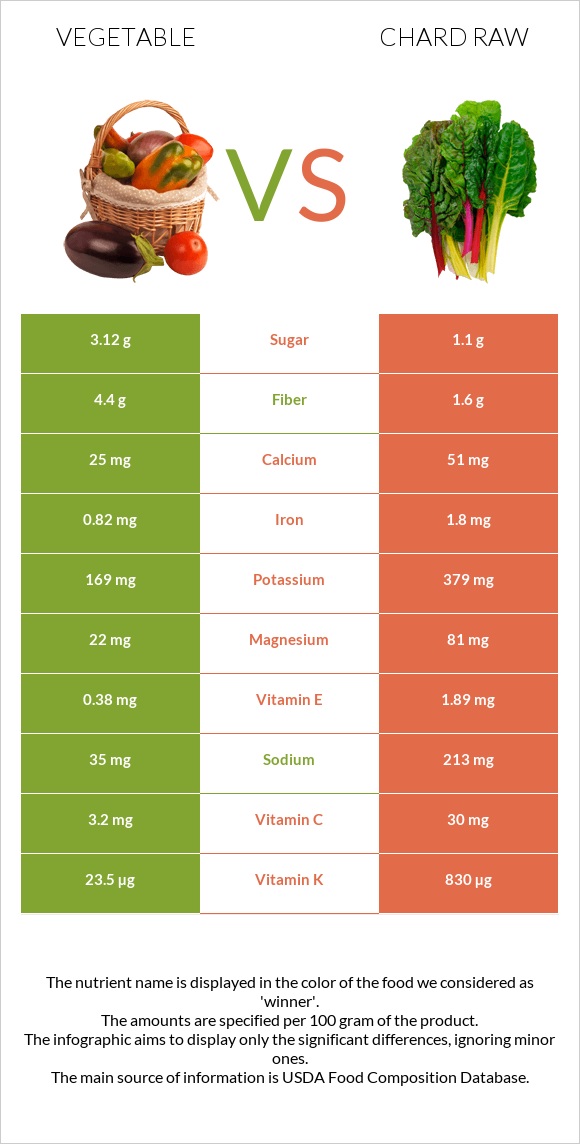Vegetable vs. Chard raw — In-Depth Nutrition Comparison
Compare
Differences between vegetable and chard raw
- Vegetable has more fiber, while chard raw has more vitamin K, vitamin A, vitamin C, magnesium, iron, copper, vitamin E, and potassium.
- Chard raw's daily need coverage for vitamin K is 672% higher.
- Chard raw contains 3 times less fiber than vegetable. Vegetable contains 4.4g of fiber, while chard raw contains 1.6g.
- The amount of sodium in vegetable is lower.
- Chard raw has a lower glycemic index. The glycemic index of chard raw is 32, while the glycemic index of vegetable is 66.
The food types used in this comparison are Vegetables, mixed, frozen, cooked, boiled, drained, without salt and Chard, swiss, raw.
Infographic

Infographic link
Mineral Comparison
Mineral comparison score is based on the number of minerals by which one or the other food is richer. The "coverage" charts below show how much of the daily needs can be covered by 300 grams of the food.
| Contains more ZincZinc | +36.1% |
| Contains less SodiumSodium | -83.6% |
| Contains more MagnesiumMagnesium | +268.2% |
| Contains more CalciumCalcium | +104% |
| Contains more PotassiumPotassium | +124.3% |
| Contains more IronIron | +119.5% |
| Contains more CopperCopper | +115.7% |
| Contains more SeleniumSelenium | +200% |
Vitamin Comparison
Vitamin comparison score is based on the number of vitamins by which one or the other food is richer. The "coverage" charts below show how much of the daily needs can be covered by 300 grams of the food.
| Contains more Vitamin B1Vitamin B1 | +77.5% |
| Contains more Vitamin B2Vitamin B2 | +33.3% |
| Contains more Vitamin B3Vitamin B3 | +112.8% |
| Contains more FolateFolate | +35.7% |
| Contains more Vitamin CVitamin C | +837.5% |
| Contains more Vitamin AVitamin A | +43% |
| Contains more Vitamin EVitamin E | +397.4% |
| Contains more Vitamin B5Vitamin B5 | +13.9% |
| Contains more Vitamin B6Vitamin B6 | +33.8% |
| Contains more Vitamin KVitamin K | +3431.9% |
All nutrients comparison - raw data values
| Nutrient |  |
 |
DV% diff. |
| Vitamin K | 23.5µg | 830µg | 672% |
| Vitamin C | 3.2mg | 30mg | 30% |
| Magnesium | 22mg | 81mg | 14% |
| Iron | 0.82mg | 1.8mg | 12% |
| Fiber | 4.4g | 1.6g | 11% |
| Copper | 0.083mg | 0.179mg | 11% |
| Vitamin A | 214µg | 306µg | 10% |
| Vitamin E | 0.38mg | 1.89mg | 10% |
| Sodium | 35mg | 213mg | 8% |
| Potassium | 169mg | 379mg | 6% |
| Carbs | 13.09g | 3.74g | 3% |
| Calcium | 25mg | 51mg | 3% |
| Vitamin B1 | 0.071mg | 0.04mg | 3% |
| Vitamin B3 | 0.851mg | 0.4mg | 3% |
| Calories | 65kcal | 19kcal | 2% |
| Protein | 2.86g | 1.8g | 2% |
| Vitamin B2 | 0.12mg | 0.09mg | 2% |
| Vitamin B6 | 0.074mg | 0.099mg | 2% |
| Zinc | 0.49mg | 0.36mg | 1% |
| Phosphorus | 51mg | 46mg | 1% |
| Manganese | 0.379mg | 0.366mg | 1% |
| Selenium | 0.3µg | 0.9µg | 1% |
| Folate | 19µg | 14µg | 1% |
| Choline | 24.1mg | 18mg | 1% |
| Fats | 0.15g | 0.2g | 0% |
| Net carbs | 8.69g | 2.14g | N/A |
| Sugar | 3.12g | 1.1g | N/A |
| Vitamin B5 | 0.151mg | 0.172mg | 0% |
| Saturated fat | 0.031g | 0.03g | 0% |
| Monounsaturated fat | 0.01g | 0.04g | 0% |
| Polyunsaturated fat | 0.072g | 0.07g | 0% |
| Tryptophan | 0.029mg | 0.017mg | 0% |
| Threonine | 0.115mg | 0.083mg | 0% |
| Isoleucine | 0.139mg | 0.147mg | 0% |
| Leucine | 0.19mg | 0.13mg | 0% |
| Lysine | 0.17mg | 0.099mg | 0% |
| Methionine | 0.034mg | 0.019mg | 0% |
| Phenylalanine | 0.12mg | 0.11mg | 0% |
| Valine | 0.149mg | 0.11mg | 0% |
| Histidine | 0.073mg | 0.036mg | 0% |
Macronutrient Comparison
Macronutrient breakdown side-by-side comparison
| Contains more ProteinProtein | +58.9% |
| Contains more CarbsCarbs | +250% |
| Contains more FatsFats | +33.3% |
| Contains more WaterWater | +11.3% |
| Contains more OtherOther | +138.8% |
Fat Type Comparison
Fat type breakdown side-by-side comparison
| Contains more Mono. FatMonounsaturated fat | +300% |
~equal in
Saturated fat
~0.03g
~equal in
Polyunsaturated fat
~0.07g